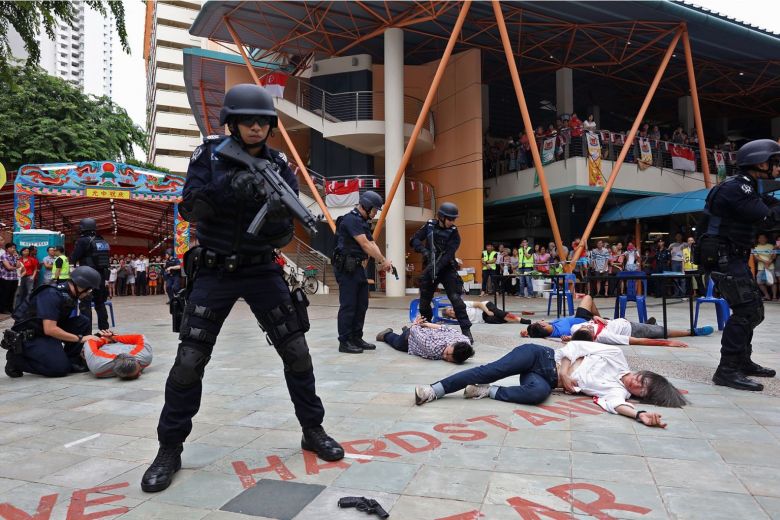Parliament: Communications stop order in public order Bill not an information blackout, says Josephine Teo
Sign up now: Get ST's newsletters delivered to your inbox

Officers from the Emergency Response Team, Tanglin Division and Ground Response Force from Toa Payoh Neighbourhood Police Centre during a counter-terrorism exercise, on Aug 6, 2016.
PHOTO: ST FILE
SINGAPORE - The curbs on communications under a new law that seeks to expand police powers to deal with serious incidents will not result in an information blackout as some have suggested, said Second Minister for Home Affairs Josephine Teo on Wednesday (March 21).
Selected media outlets and personnel will be allowed to access incident areas even when such a stop order is issued.
It is also not targeted at civilians in a hostage situation who try to get information across to security forces.
Speaking at the second reading of the Public Order and Safety (Special Powers) Bill on Wednesday, she said: "(It) is not an information blackout throughout a terror incident, as some have portrayed it."
The communications stop order has garnered much attention since the Bill's introduction last month. It requires people to stop making or communicating films or pictures of an incident area, and stop communicating text or audio messages about the security operations.
Local civil society groups, international non-governmental organisations and members of the public have raised concerns about the effect of the stop order, calling for the media to be allowed to report facts even if live streaming is not permitted.
Others asked if people who tip off the media will be penalised.
Mrs Teo told Parliament that media outlets allowed to access incident areas can record events for subsequent use such as post-incident reporting.
She added that the order is not aimed at civilians in a hostage situation who may, for example, be trying to get information across to security forces by any means possible.
Noting that terrorists holding hostages in overseas incidents have found out about police operations through live telecasts, she said: "We are trying to stop irresponsible communication of ongoing security operations which may endanger lives, such as those of the hostages."
On the argument that people should be allowed to film but not transmit material or put it online, she cautioned that "half measures will not cut it" and the stop orders may only be able to reduce - but not eradicate - the risk of unauthorised communications.
"The best laid plans of the police can be thwarted by a stray tweet or social media livestream," she said.
Mrs Teo also said the stop order will apply only to target areas and is limited in duration. It will be lifted after security operations are over.
Like other special powers in the Bill, it may last a maximum period of a month. A breach of the order may lead to a maximum of two years' jail, a fine of up to $20,000, or both.
On March 13, six civil society groups had raised concerns about the Bill's "wide-reaching police powers", including to potentially deploy lethal force and stop communications during both terror incidents and peaceful protests.
Mrs Teo said on Wednseday that the range of special powers under the Bill do not automatically come into force even if activated by the Home Affairs Minister, and each power has to be unlocked by the Police Commissioner "only as and when deemed necessary".
The duration of each activation order is also capped at one month, after which, the Minister must make a new order if he assesses that there is a need for a new one.
She highlighted also that lethal weapons are turned to only as a last resort and the Bill allows it to be used, among other cases, to disperse public assemblies which may be threatening public safety or order.
Under the current Public Order (Preservation) Act, which will be repealed with the passing of new law, Parliament could annul the Home Affairs minister's activation order. This, however, will not be the case under the new Bill.
"There is no sinister reason for this," said Mrs Teo. "Even without the provision, members can question the minister if they believe an activation order should not have been issued, or should be annulled.
"Parliament has not been, and is not prevented from holding ministers to account for decisions or policies, just because there are no specific provisions in the law," she said.
On another provision in the Bill that allows civilians such as private security officers to be activated to help out during a serious incident, Mrs Teo said these civilians are not obliged to do so and will only have limited powers that exclude use of lethal force.
"A civilian can refuse to assist and no action will be taken against him," she said.


